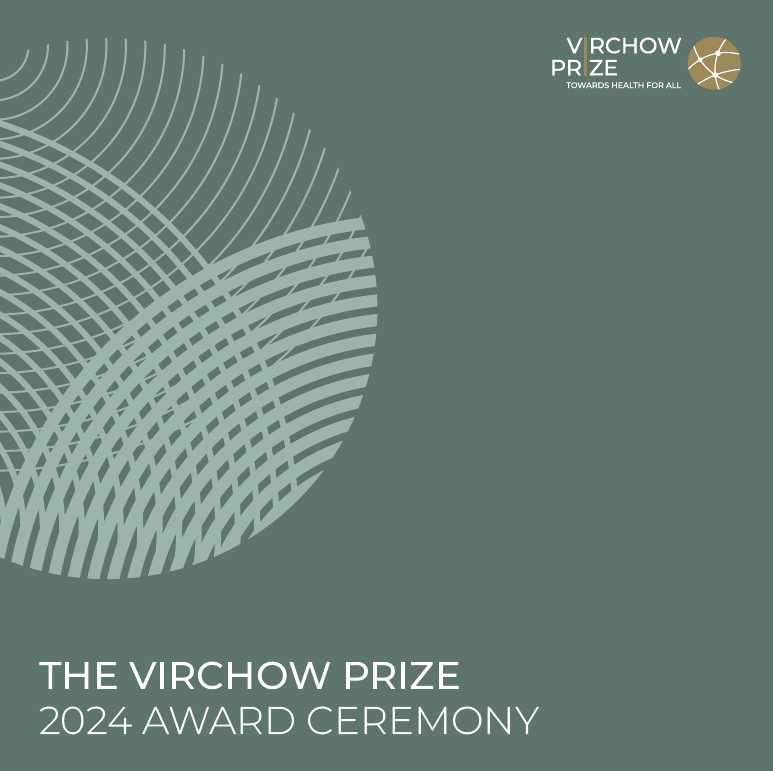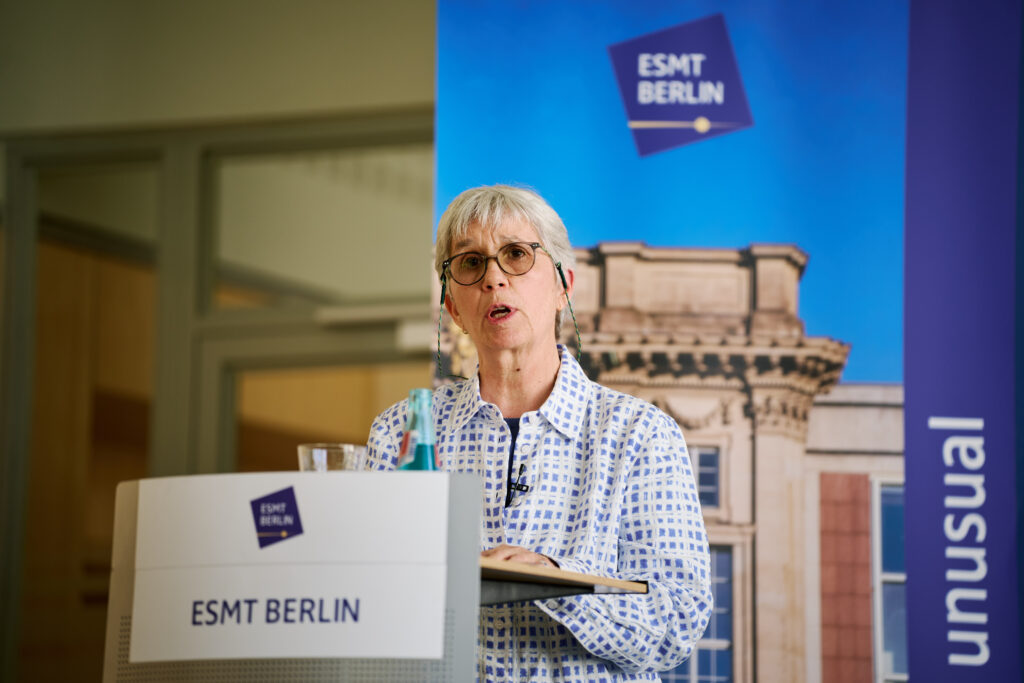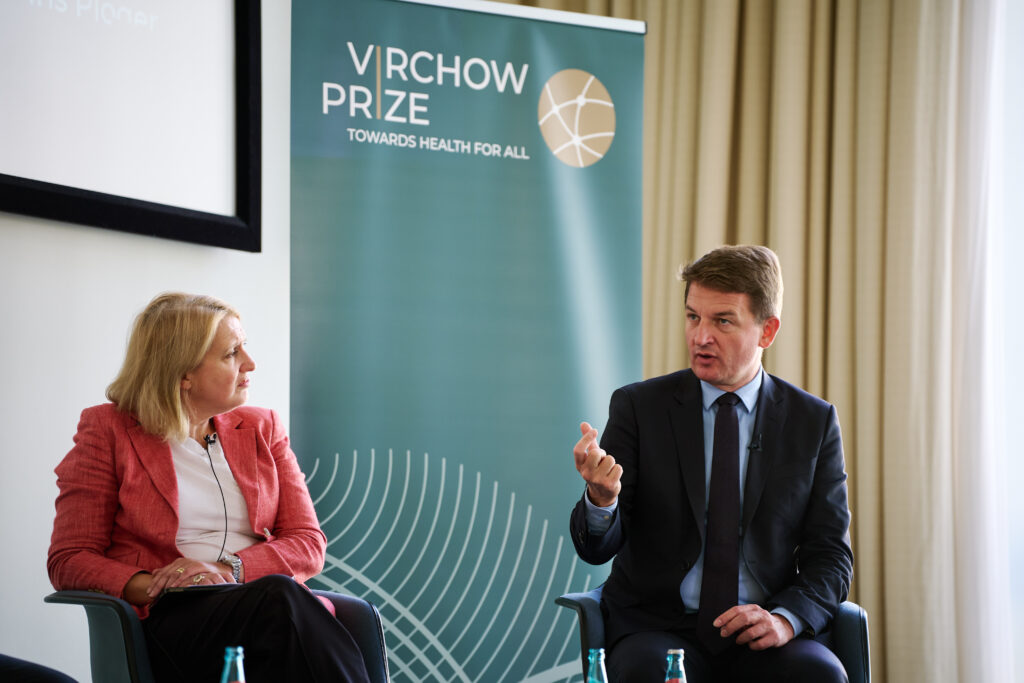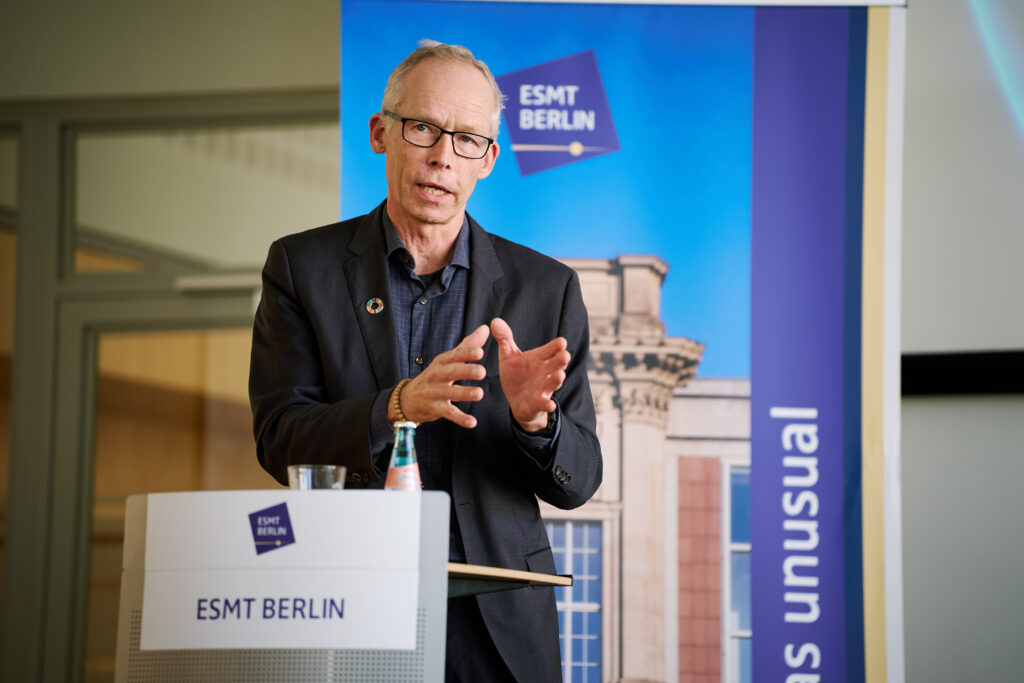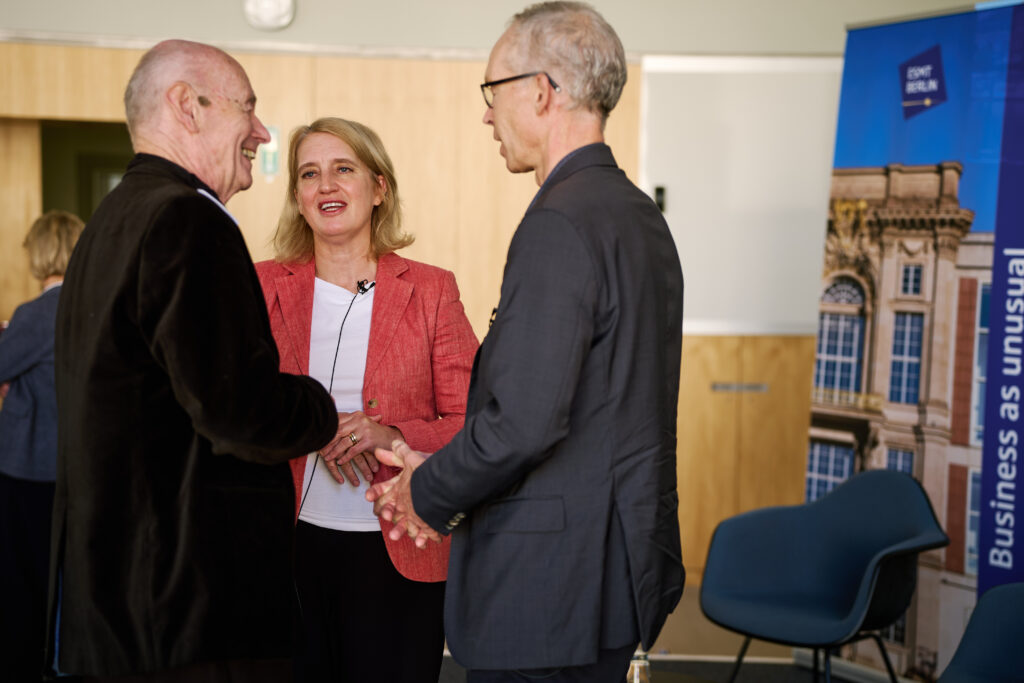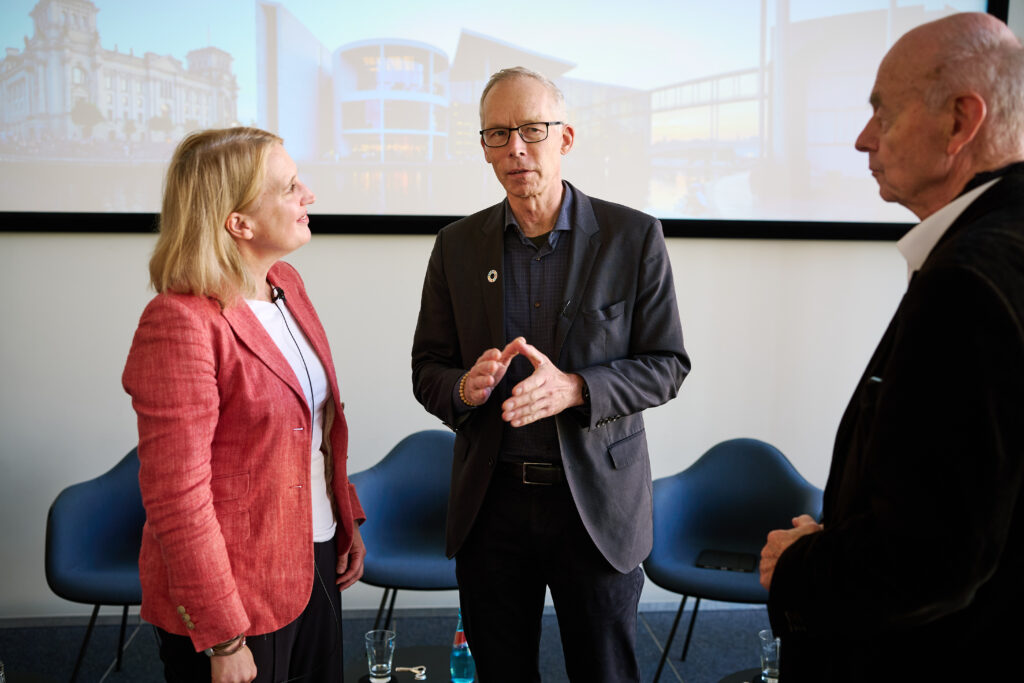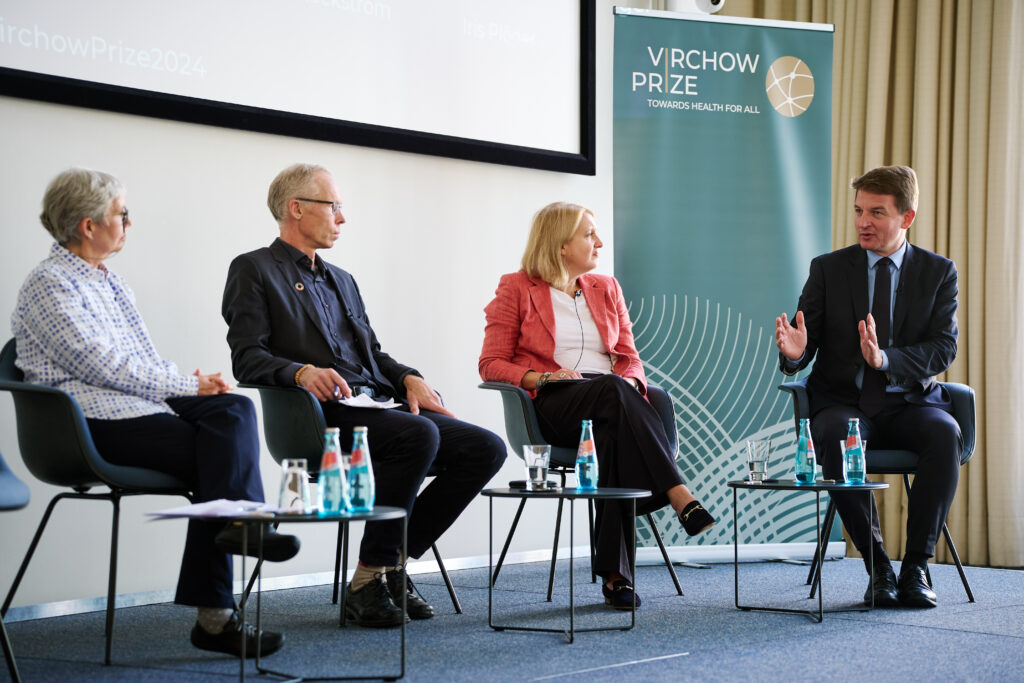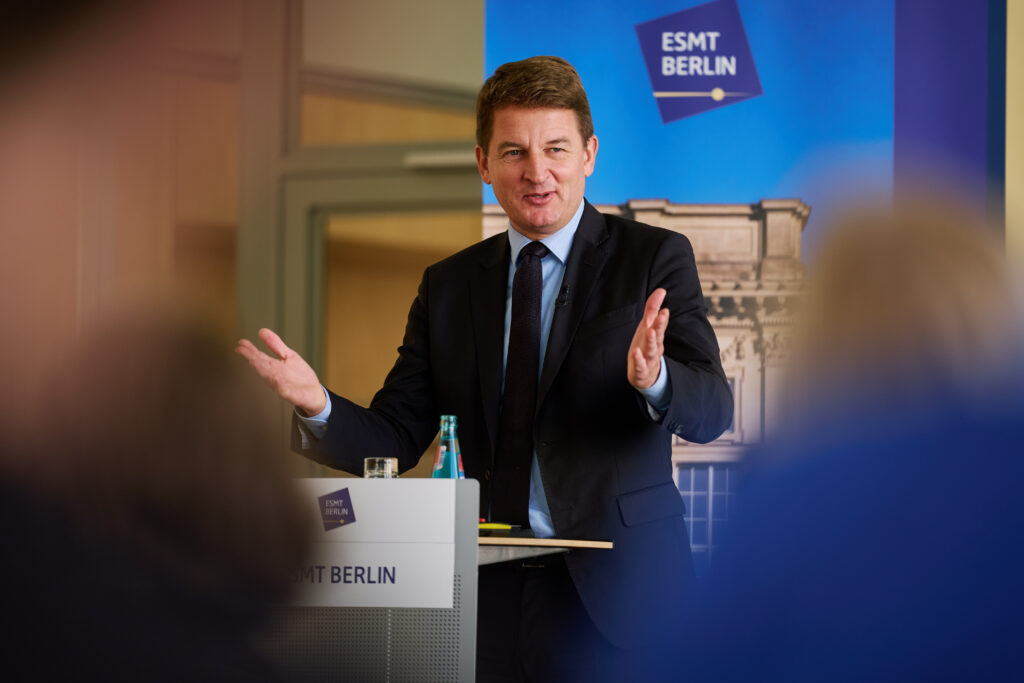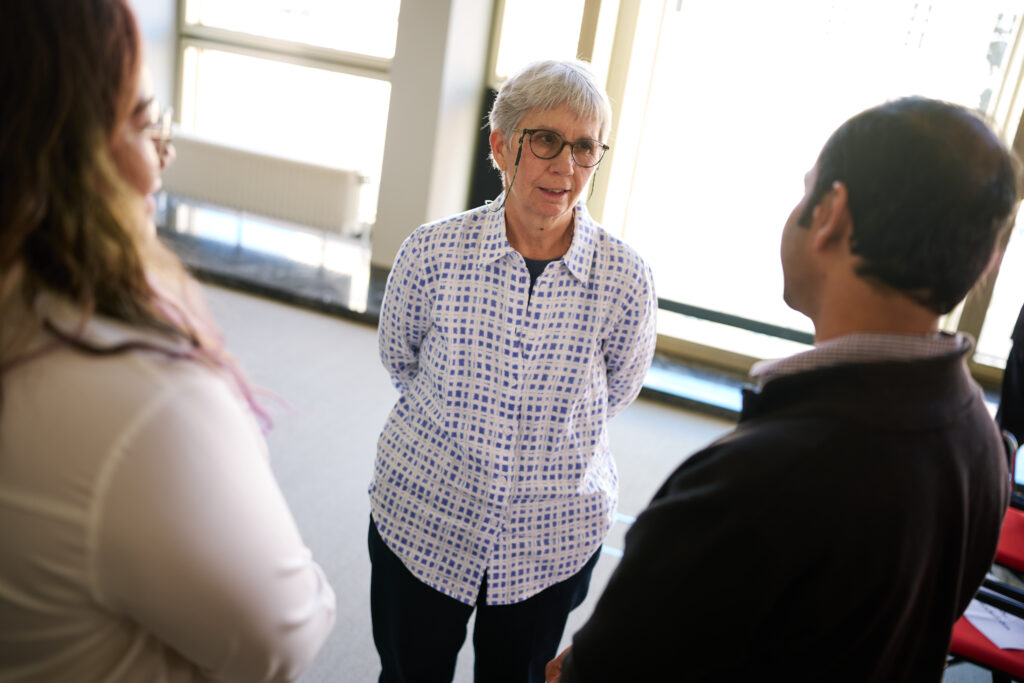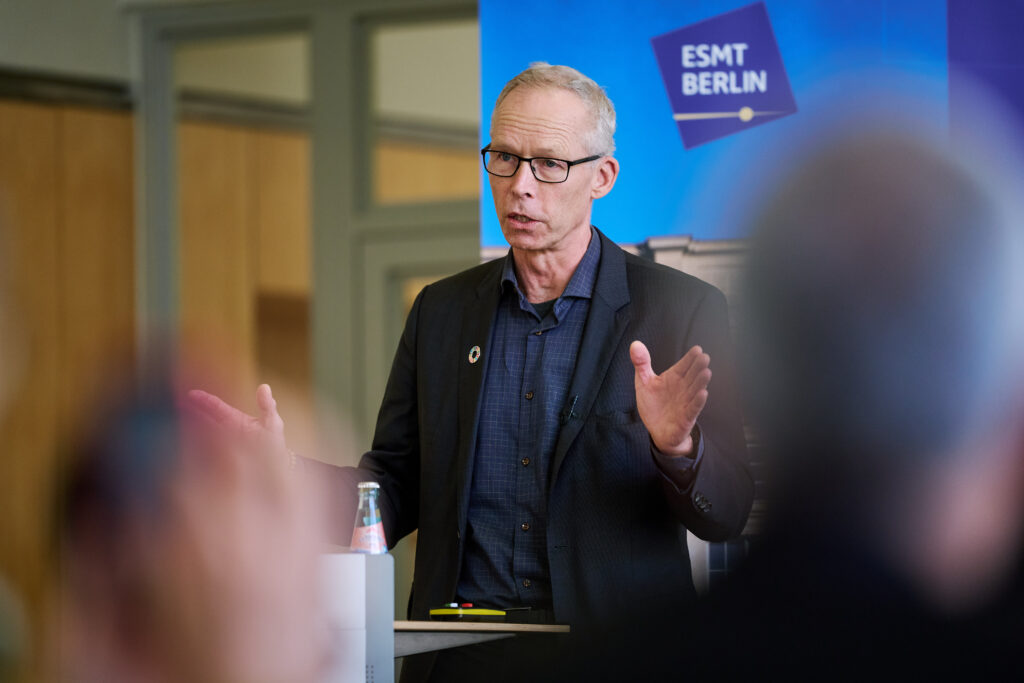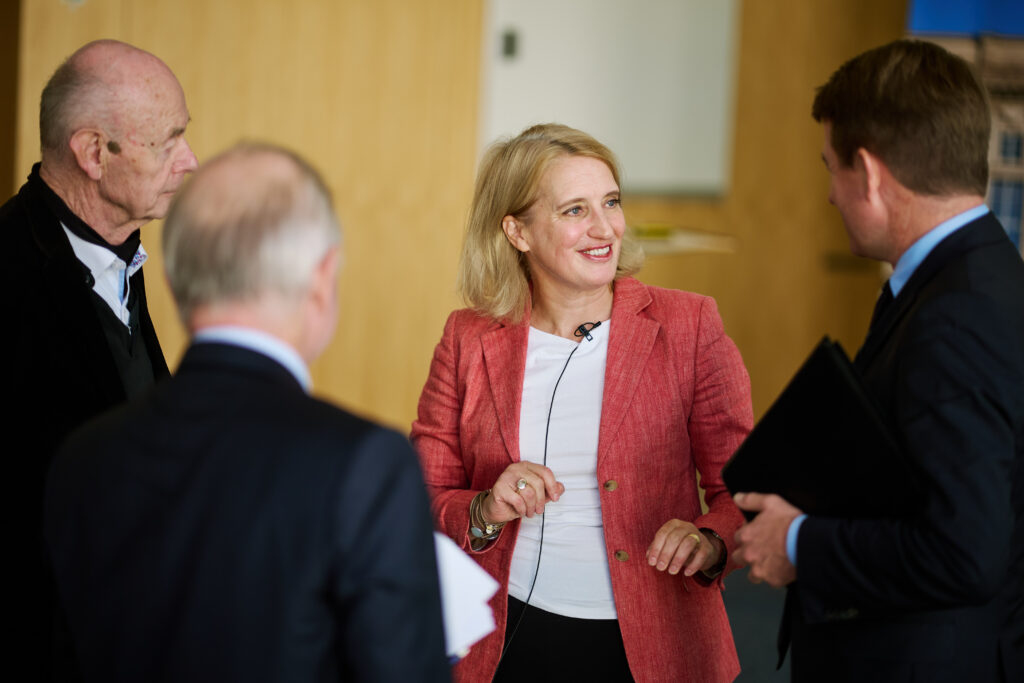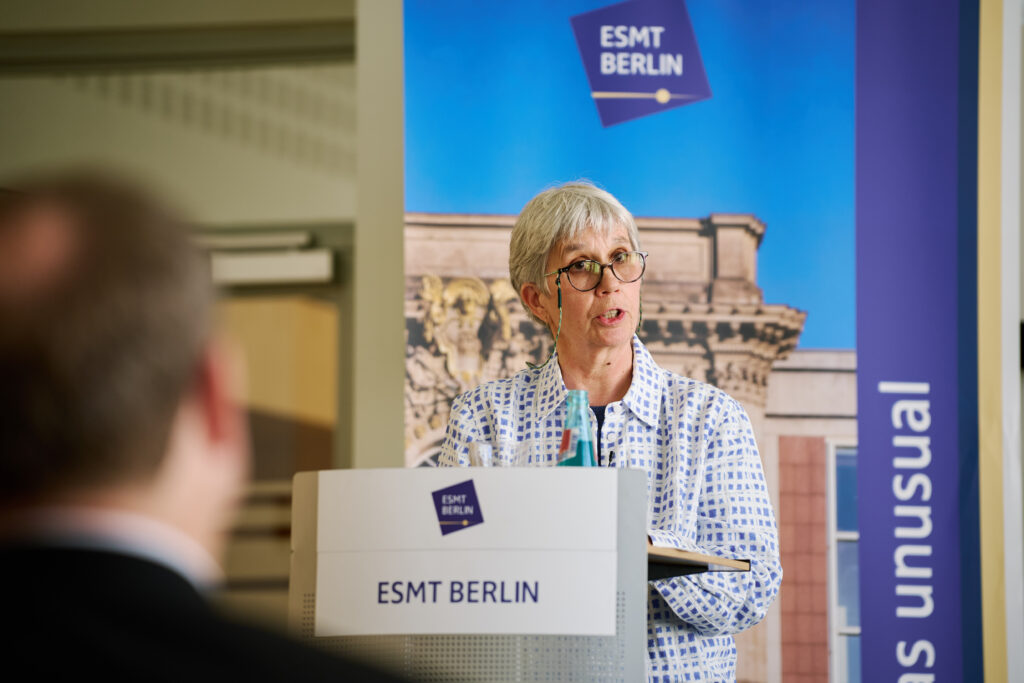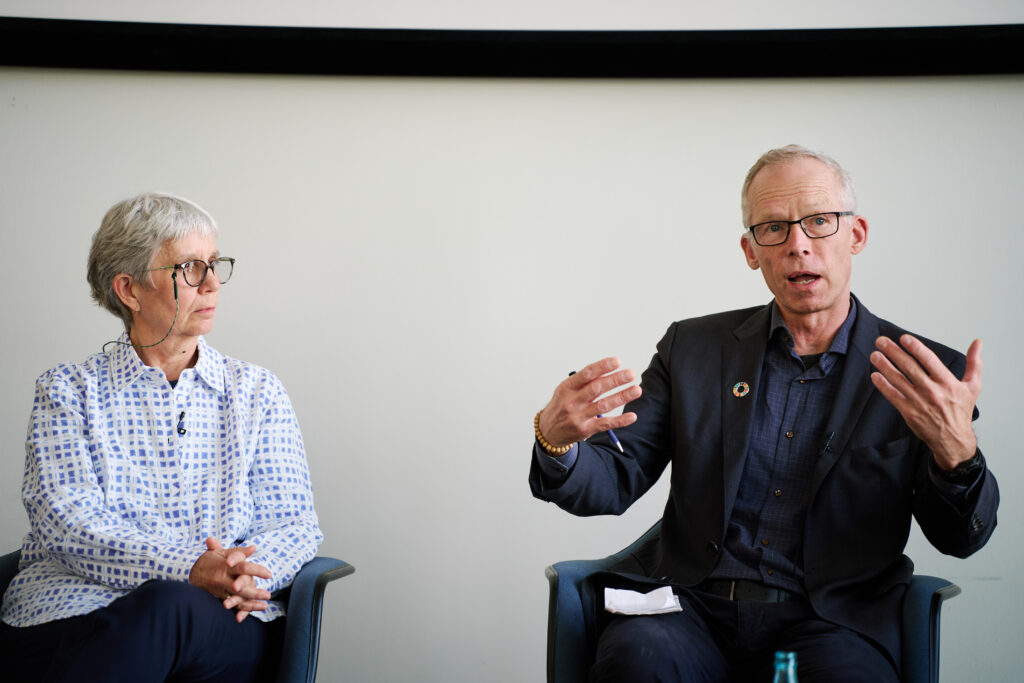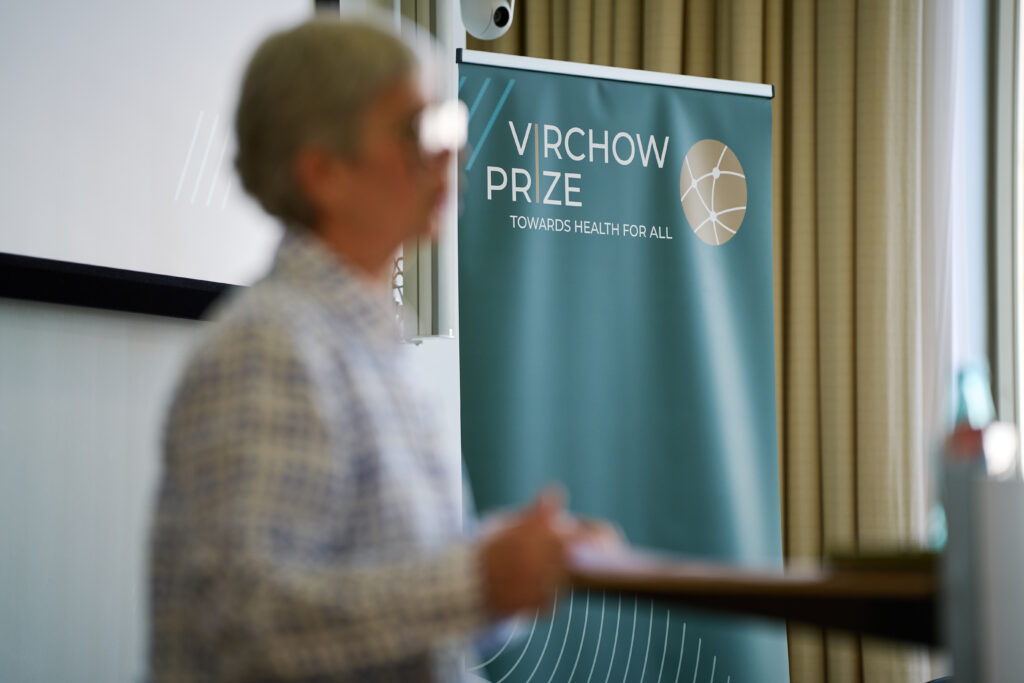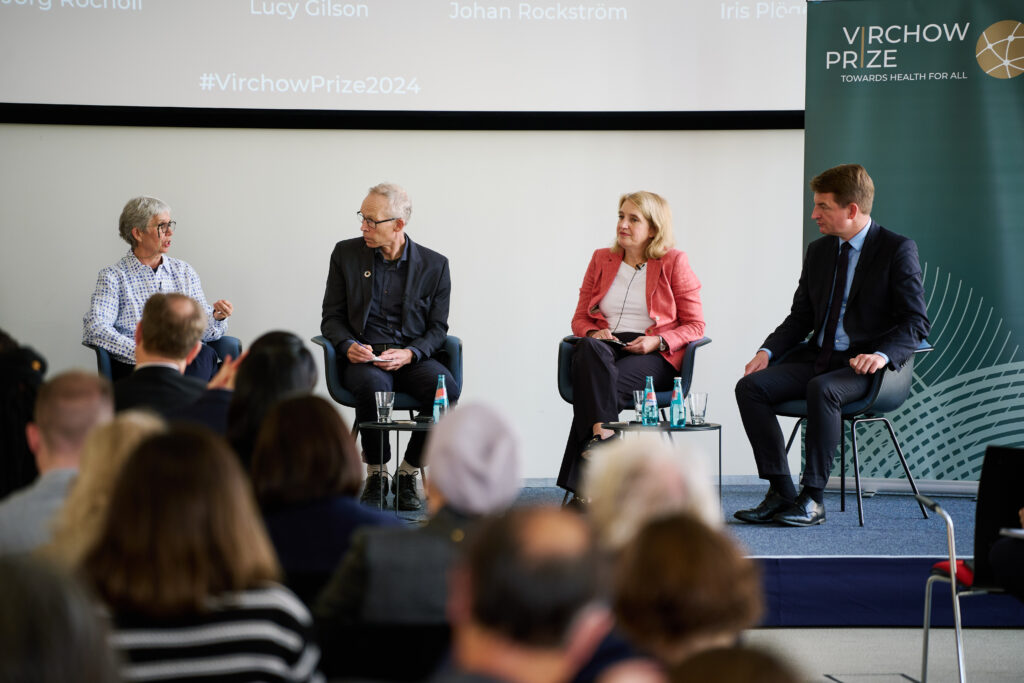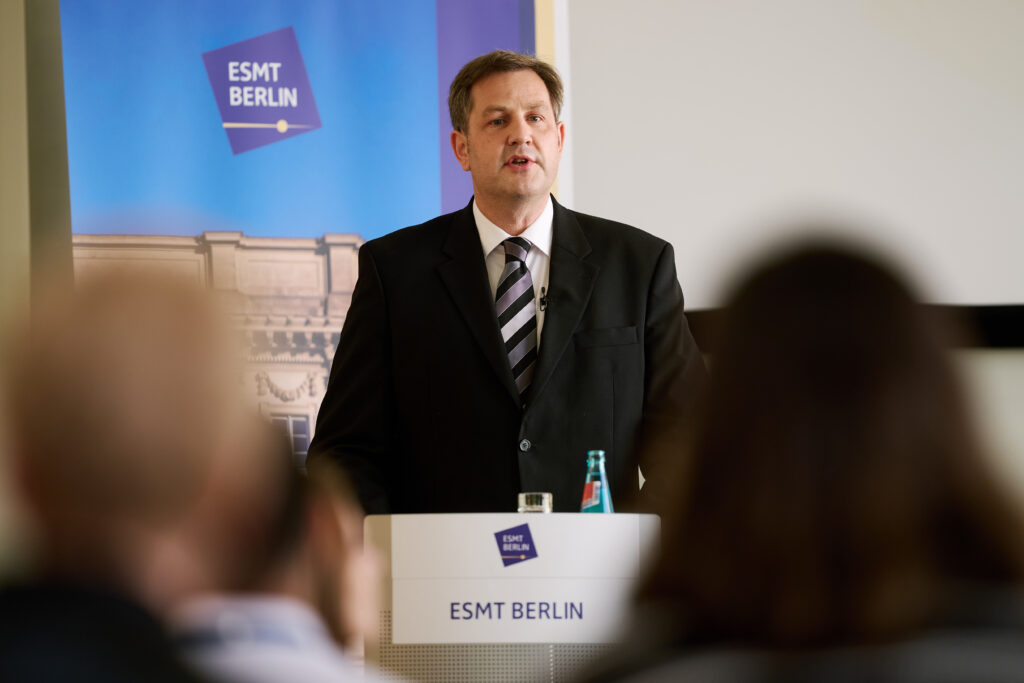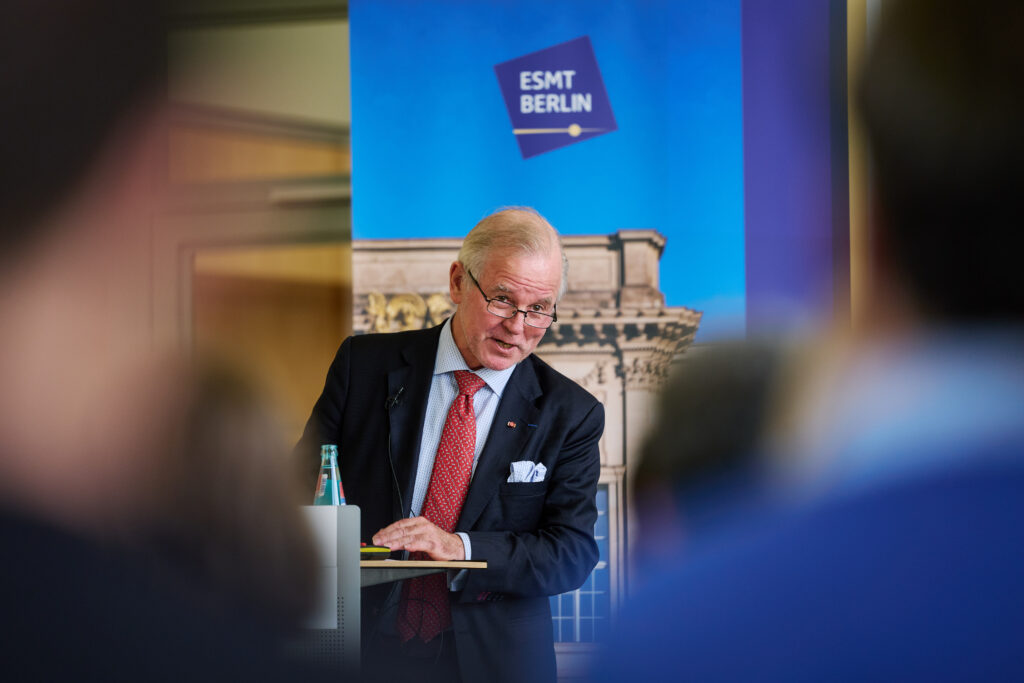BÄRBEL BAS
PRESIDENT OF THE GERMAN BUNDESTAG
The Virchow Prize 2024
Towards Health for All
THE VIRCHOW PRIZE 2024 IS AWARDED TO
Johan Rockström
University of Stockholm, Sweden
Potsdam Institute for Climate Impact Research, Germany
Lucy Gilson
University of Cape Town, South Africa
London School of Hygiene and Tropical Medicine, UK
“for their holistic and systems-based approach
safeguarding human and planetary health”
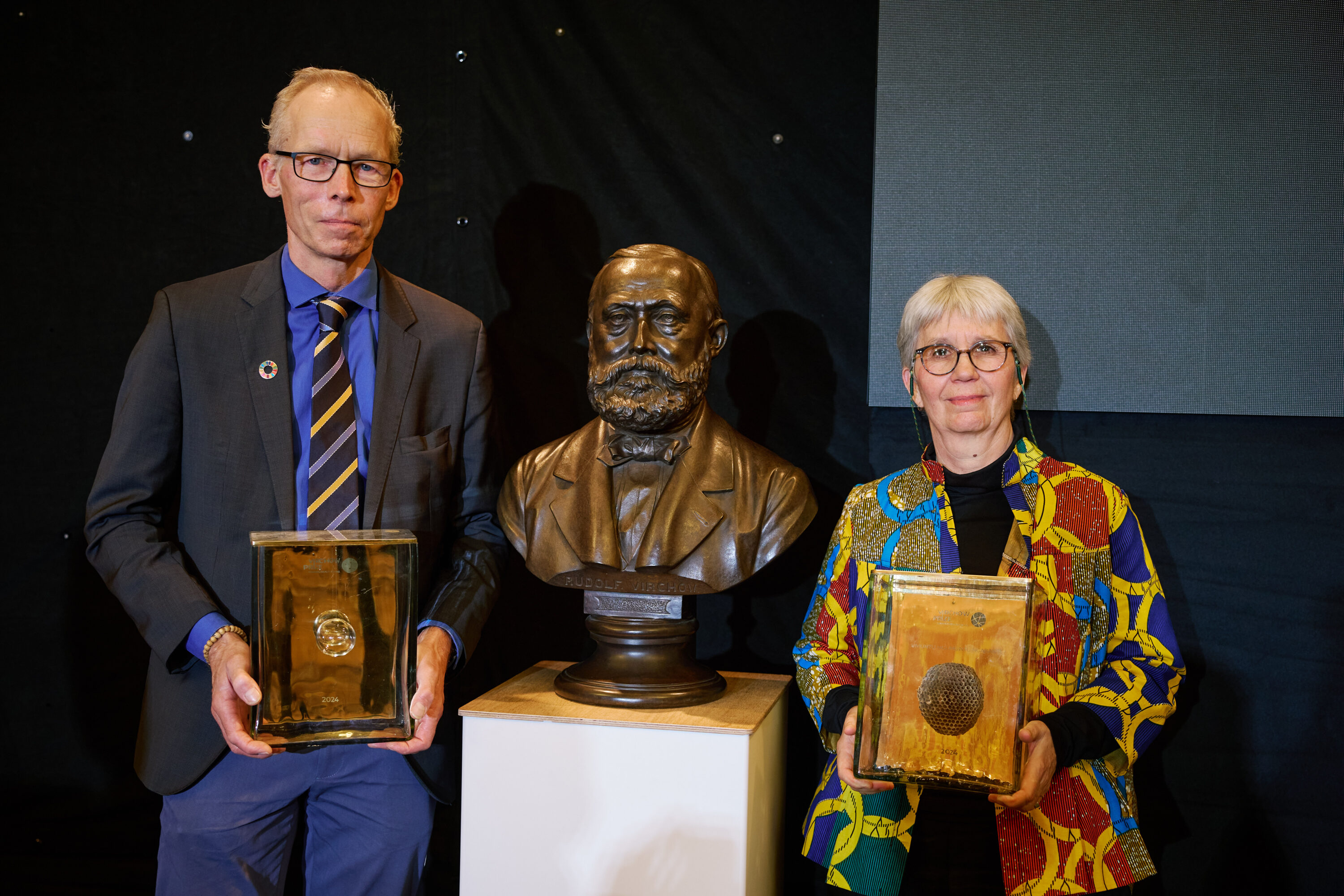
Joint Statement of Lucy Gilson and Johan Rockström
The Virchow Prize 2024 Laureates
“Being jointly honoured with the Virchow Prize is a wonderful and very special surprise for both of us.
We, Lucy Gilson and Johan Rockström, therefore feel stimulated to make a brief joint statement in addition to personally thanking the Virchow Foundation and the Virchow Prize Committee.
Although we have so far never collaborated or published on joint projects, we both recognise that the health of our planet and human health are closely linked. We also both sought to understand and address such complexity in our quite different areas of work by adopting an holistic and systemic approach. The fact that the prestigious Virchow Prize has been bestowed upon us jointly, although we work in different areas of research, is a strong signal for us and hopefully for others of the importance of addressing complexity through even stronger transdisciplinary exchange and collaboration, and the application of systems thinking.
We are proud to be honoured with the Virchow Prize 2024. This encourages us to continue our own research and we hope that it will stimulate collaboration between seemingly separate communities towards ‘Health for All’ in the spirit of Rudolf Virchow.“
The Virchow Prize 2024 Announcement
as made by
Professor Dr. Dr. h.c. mult. Christoph Markschies
Co-Founder & Member of the Board of Trustees | Virchow Foundation
President | Berlin-Brandenburg Academy of Sciences and Humanities
Prof. Dr. Detlev Ganten
Co-Founder & Member of the Board of Trustees | Virchow Foundation
Roland Göhde
Co-Founder & CEO | Virchow Foundation
PREAMBLE
All major problems affecting the future of humanity are global and complex. The UN 2030 Agenda serves as beacon for what we must achieve collectively and in international partnership. Health is an effective entry point and compass for the Agenda’s Sustainable Development Goals (SDGs) as health significantly influences and is linked to all 17 SDGs. Better health on a healthy planet is a key aspiration for the future of mankind. Intuitively and universally, health is understood as having paramount importance and equal value for each person, individually and for our loved ones, and for all societies on our one planet earth.
Improving health is much more than medicine. To address and resolve the exceptional complexity at the local and at the global level, it requires cross-sectoral, transdisciplinary and collaborative efforts between the healthcare system, science, civil society, policymakers, governance and the private sector. Preserving health and overcoming disease is the pressing challenge of our time and the most noble goal.
Rudolf Virchow was a scientist, physician, anthropologist and politician. Virchow is a symbol and role model for the urgently needed holistic approach to improve health for all and thereby providing an example of global responsibility for generations to come. In this spirit, the Virchow Prize, deeply rooted in highest-quality research and profound humanistic academic values, intends to further strengthen our efforts to a better future.
On behalf of the Virchow Foundation for Global Health and the Virchow Prize Committee it is our great privilege to announce that the 2024 Virchow Prize is bestowed upon
LUCY GILSON AND JOHAN ROCKSTRÖM
“for their holistic and systems-based approach safeguarding human and planetary health”.
The 2024 Virchow Prize is bestowed upon Lucy Gilson and Johan Rockström for their pioneering contributions to the analysis and understanding of the importance of efficient health systems and the decisive role of climate and planetary boundaries to preserve the conditions for healthy lives on our planet earth. With their work based on systems thinking, both laureates are shining examples of how, in the spirit of Rudolf Virchow, significant progress can be achieved by interdisciplinary and cross-sectoral science towards the implementation of health for all.
The 2024 Virchow Prize is bestowed upon Lucy Gilson and Johan Rockström for their pioneering contributions to the analysis and understanding of the importance of efficient health systems and the decisive role of climate and planetary boundaries to preserve the conditions for healthy lives on our planet earth. With their work based on systems thinking, both laureates are shining examples of how, in the spirit of Rudolf Virchow, significant progress can be achieved by interdisciplinary and cross-sectoral science towards the implementation of health for all.
Lucy Gilson is a world leading health policy and systems researcher. She currently heads the Health Policy and Systems Division in the School of Public Health at Cape Town University and is Professor of Health Policy and Systems at the London School of Hygiene and Tropical Medicine (LSHTM). Gilson studied Politics, Philosophy and Economics at Oxford University. She received a Master’s Degree in Development Economics (1983) from the University of East Anglia and a PhD in Health Economics (1992) from LSHTM. Gilson was a Planner with the Ministry of Health, Swaziland and Fellow for the UK Overseas Development Institute until 1986, transitioning to the role of Research Fellow and Lecturer of the Health Policy Unit at the LSHTM until 1995 when she became Deputy Director for the Centre for Health Policy at the University of the Witwatersrand. Though the bulk of Gilson’s work focuses on resource-poor settings in Sub-Saharan Africa and Asia, including the aspect of ensuring access to quality healthcare for marginalized and vulnerable populations, the implications and impact of her research are truly global.
Gilson’s methods include close collaboration with decision makers at various levels of health systems ensuring transformative change towards more sustainable, resilient and just governance for healthy populations, championing the concept of people-centred health systems. Gilson explores how health services are organised, financed, and delivered, assessing the determinants of health and the impact of inequity. She emphasizes the eminent role of governance and leadership in strengthening systems for health and how different governance structures and leadership styles can affect health systems and thus the population in communities and societies.
Gilson has continuously and significantly contributed to the development of Health Policy and Systems Research (HPSR) as a widely recognized field of importance to drive improvements in health service delivery. With her work she underscores that a comprehensive understanding of how health systems react and adapt to health policies and their corresponding measures requires interdisciplinarity and cross-sectoral collaboration in sociology, anthropology, political science and economy, particular in relation to medicine, public health and epidemiology. In her 2003 paper in Social Science & Medicine, Gilson stresses the importance of developing health care as social institutions, stating that it is trust and collective action that drive the achievement of common goals. Her key message of this paper is that trust matters to health systems and trust-based health systems matter to society while the state plays a central role to manage the processes for which these systems have meaning.
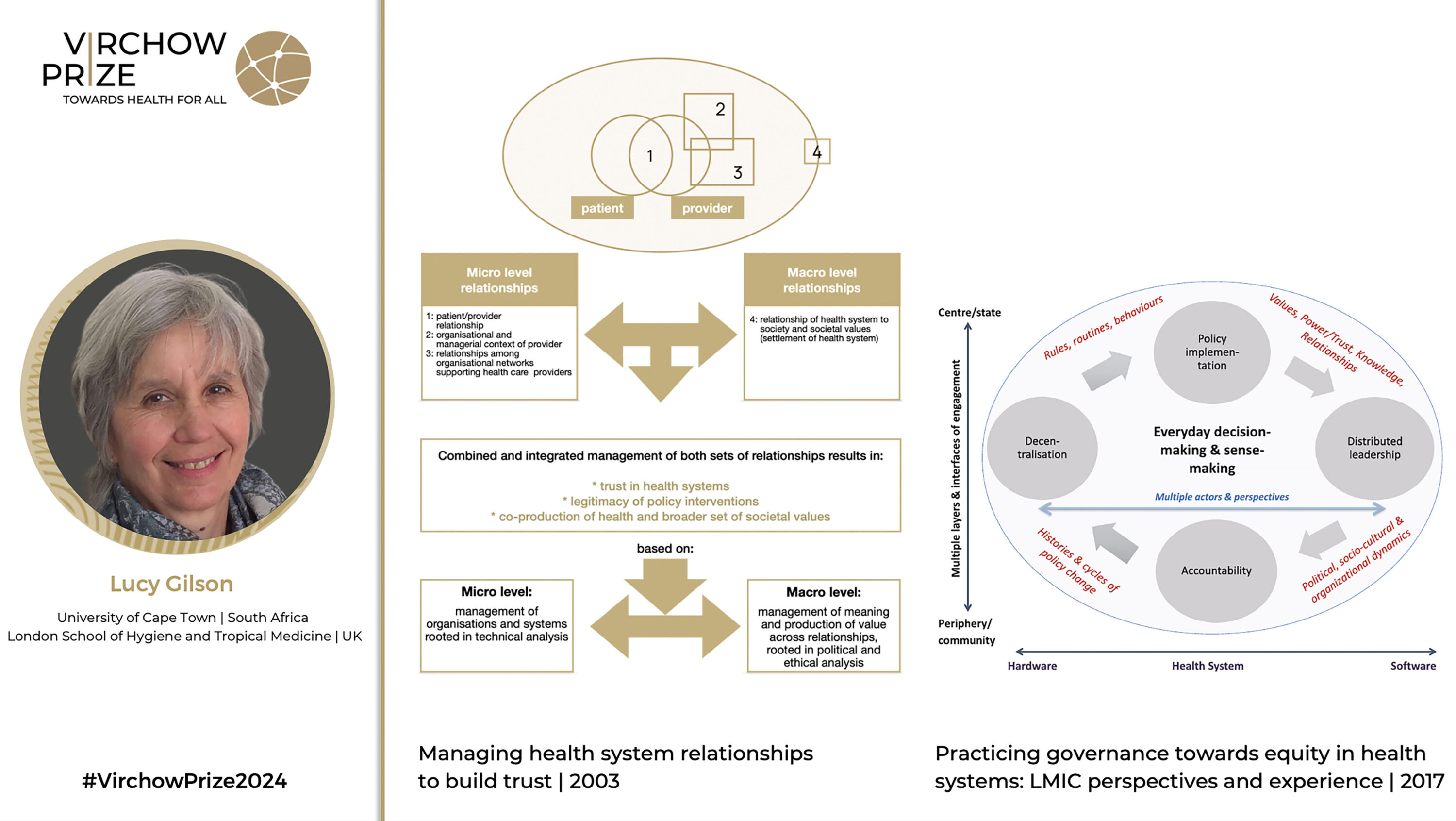
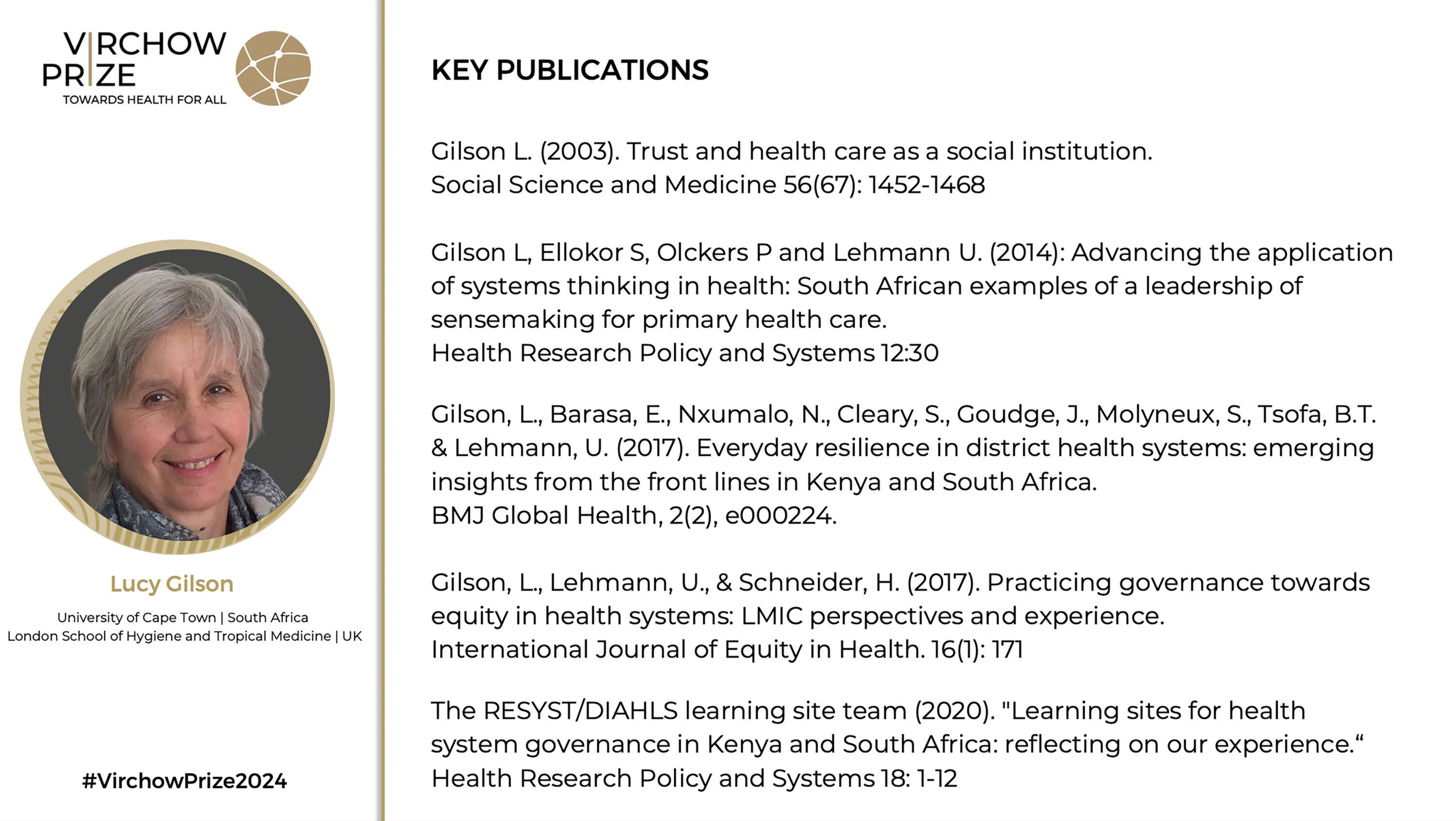
Lucy Gilson not only focuses on these areas from a strategic and policy perspective, but also contributes to the understanding of how health policies and interventions can effectively be implemented in demanding real world-settings, e.g. by examining both facilitators and barriers to implementation. In her 2017 editorial for a special issue on the everyday practice of health system governance, she emphasised the interlinkages between implementation, leadership, accountability and decentralisation (see second figure). Further, in 2018 and 2021 papers she outlines innovative leadership development activities implemented in South Africa and Kenya, respectively, that seek to develop distributed leadership within health systems, equipping managers to be systems aware, have emotional competence, and be able to lead teams. These papers were published in the journal Health Policy and Planning, where she now serves as co-editor in chief. Strengthening health system software in this way also supports overall health system resilience by by ensuring that relationships between its central actors are nurtured and supported.
In 2018, she received the Lifetime Achievement Award from Health Systems Global for her service to the field of Health Policy and Systems Research. She has been a Fellow of the University of Cape Town since 2017 and Honorary Professor at the University of the Western Cape since 2012.
Health systems play a crucial role in achieving the United Nations 2030 Agenda Sustainable Development Goals. Gilson deserves highest credit for her outstanding contributions to health system strengthening and for her correspondingly consequent and consistent translation from the strategy level to improvements on the ground. Particularly notably are her drive and advocacy for equity in health and health care, her efforts in capacity building of young health policy systems researchers globally, as well as her seminal contributions to innovative, applied and interdisciplinary, cross-sectoral science helping to bridge the knowledge implementation gap. Lucy Gilson’s work therefore makes a significant contribution to achieving universal health coverage and to ensuring equitable access to quality healthcare.
Johan Rockström is globally recognized for his formative contributions to the development of a science-based approach for the sustainable development of humanity on a stable and resilient planet. He currently leads the Potsdam Institute for Climate Impact Research (PIK). Furthermore, he holds positions as Professor in Earth System Science at the Institute of Earth and Environmental Science, Potsdam University, as Professor in Water Systems and Global Sustainability, Stockholm University, and Chief Scientist, Conservation International. Johan Rockström studied agricultural sciences and philosophy in Uppsala, Paris, and Stockholm and received his doctorate from the Institute of Systems Ecology at Stockholm University in 1997. After working in regional consulting and research management at the Institute for Water Education in Delft, he became Managing Director of the Stockholm Environment Institute (SEI) in 2004. He founded the Stockholm Resilience Centre (SRC) at Stockholm University in 2007 and remained its director until his appointment in 2018 as Professor at the University of Potsdam.
Johan Rockström’s groundbreaking work centres around the concept of a planetary boundaries framework. Along with a group of internationally renowned scientists, in his trailblazing Nature publication from 2009 “A safe operating space for humanity”, Rockström introduced a framework of nine planetary boundaries, of which he provisionally quantified seven. These boundaries, for which Rockström has subsequently presented continually updated assessments, define the safe operating space for humanity within which we can thrive sustainably for generations to come. The planetary boundaries cover critical processes such as climate change, biodiversity loss, freshwater use, and nutrient cycles – all of which are of direct relevance to health. Crossing these boundaries increases the risk of irreversible environmental changes and ill-health. Among his more than 250 research publications, the 2023 Nature paper “Safe and just Earth system boundaries” deserves special recognition, in which Rockström and his colleagues conclude that we have transgressed 7 of the 8 globally safe and just Earth System Boundaries (ESBs), leading to a rapidly increasing population at risk to significant harm.
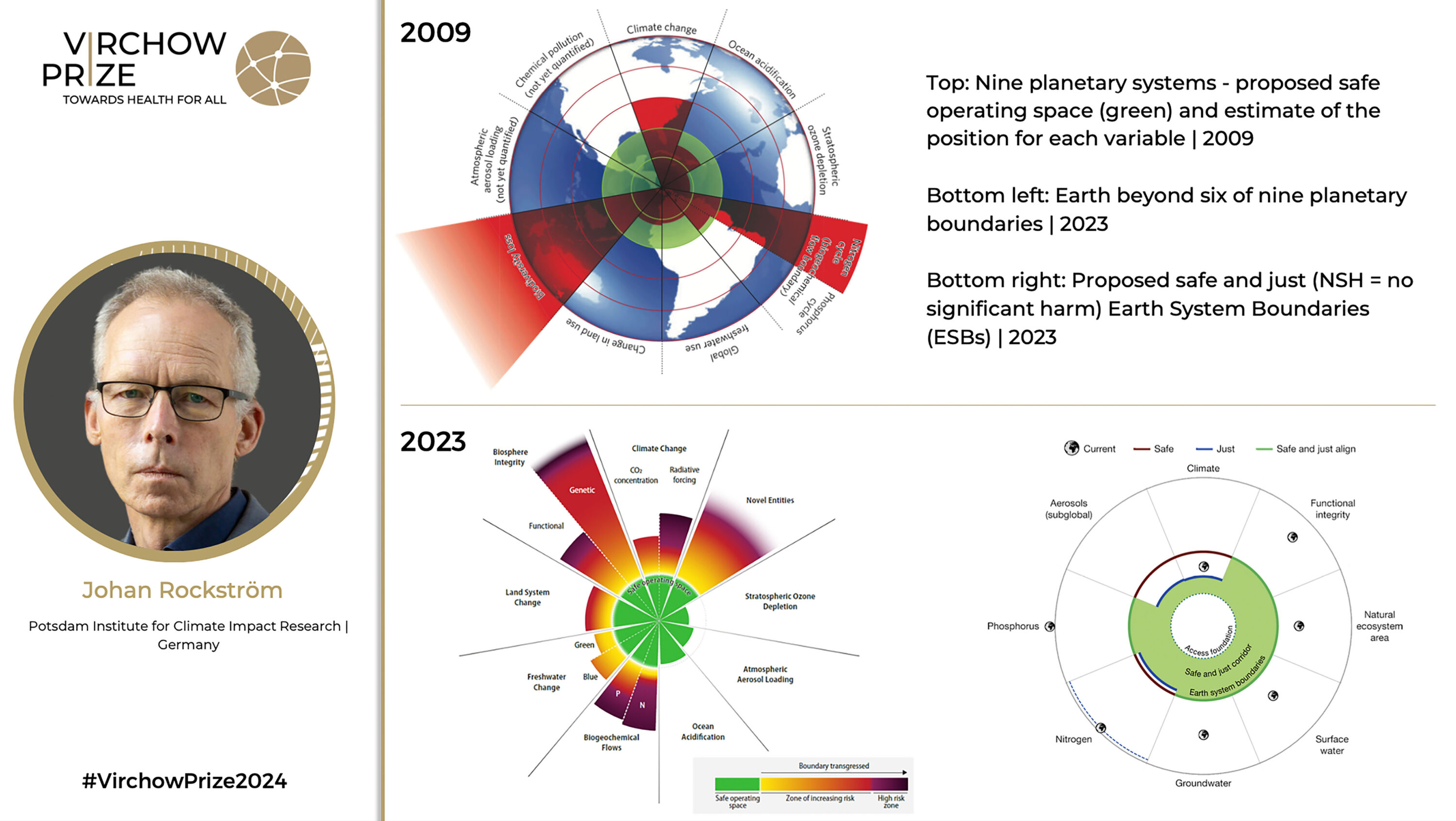
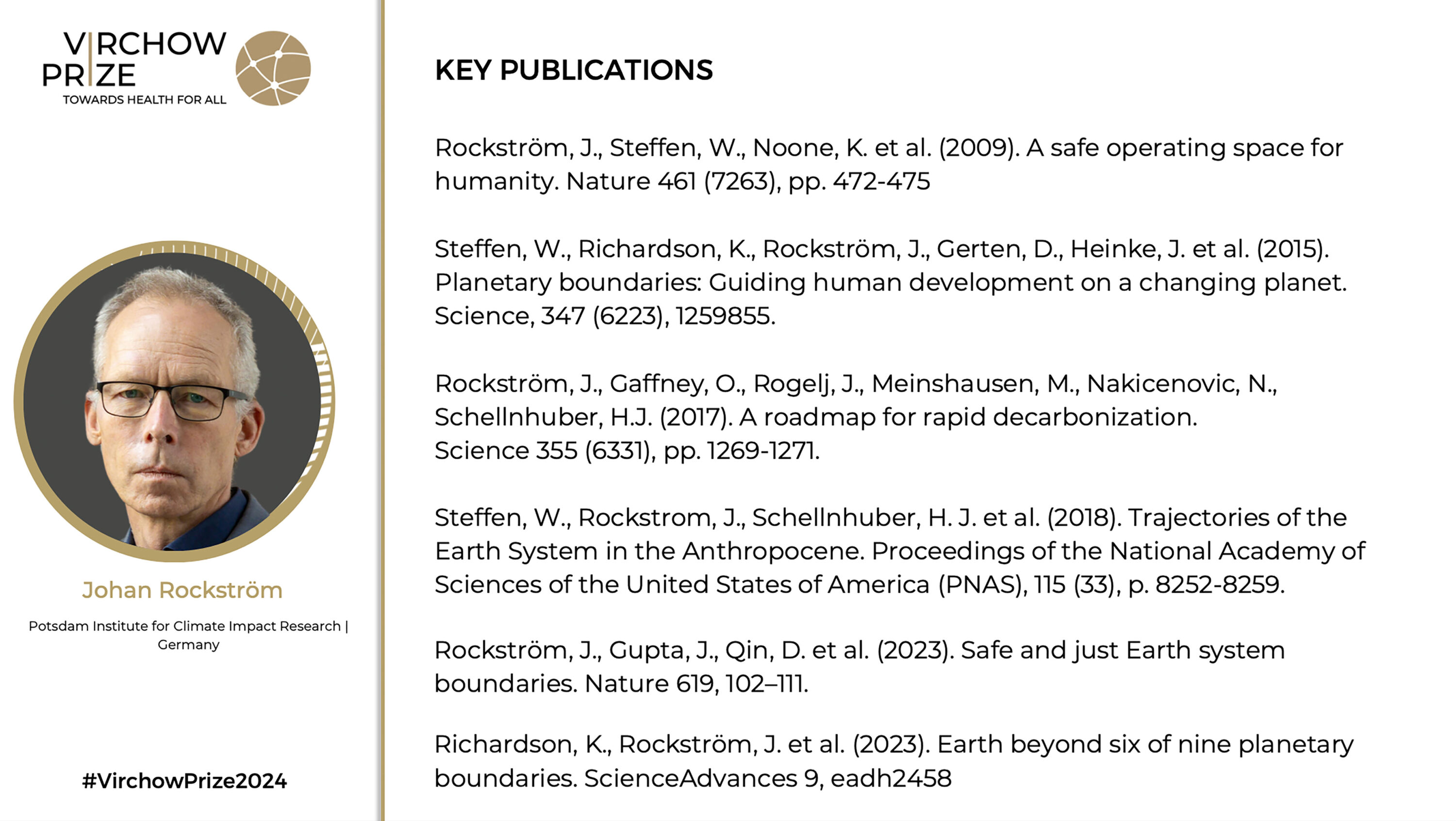
Johan Rockström co-chaired the EAT-Lancet Commission, which in 2019 published the report “Food in the Anthropocene: the EAT–Lancet Commission on healthy diets from sustainable food systems” outlining a universal healthy diet that is also environmentally sustainable. This considers that food systems have the potential to nurture human health and support environmental sustainability while they in fact are currently threatening both. The report provides scientific targets for food production that could feed a growing global population within planetary boundaries, addressing both health and environmental impacts.
Rockström is furthermore active in various scientific bodies, including the European Commission’s “Mission Board for Adaptation to Climate Change including Societal Transformation” and co-chaired the “Earth Commission”, an international team of leading scientists who evaluate and classify the latest scientific findings on global warming. He served on the Swedish Prime Minister’s Future Commission 2012-2013. In 2012 and 2013 he was voted Sweden’s most influential person on environmental issues and in 2009 Swede of the year. He has received numerous awards for his scientific achievements and commitment, including the German Environmental Award in 2015, the Prince Albert II of Monaco Climate Change Award in 2020, and, most recently, the Tyler Prize for Environmental Achievements 2024. He holds honorary doctorates from the Universities of Ghent and Amsterdam and is member of the Royal Swedish Academy of Sciences as well as the German National Academy of Sciences Leopoldina.
Johan Rockström’s work serves as paramount example of comprehensive systems thinking with utmost critical impact on human health and planetary health. By combining the planetary boundaries concept that he introduced with the SDGs, he has created a holistic approach for a prosperous and sustainable world, made significant contributions to understanding the interplay between these boundaries, the need for sustainable development within them, and their implications on global sustainability as a whole. In this respect, he has influenced the global policy debate by significantly advancing the scientific understanding of the major interconnected challenges of our time while providing a science-based framework for addressing these challenges at global, regional and local level.
COMMON MERITS OF THE VIRCHOW PRIZE LAUREATES 2024
While their specific research areas differ, Lucy Gilson and Johan Rockström share common goals related to human well-being, sustainability, resilience and global health. This is essential for our urgent recognition that health systems do not operate in isolation but rather are affected by, and impact, environmental and social systems.
Gilson and Rockström recognize that addressing health challenges is intrinsically linked to environmental stewardship, social equity and justice. Between them they amply demonstrate the power of system thinking in addressing pressing global challenges at the intersection between human health and planetary health. Addressing global inequities, both scientists stress the role of basic research, responsible communication and effective governance and policy. This important and rare combination in academia provides another crucial link between Gilson’s work on health policy processes and the role of leadership in health systems to Rockström’s call for global policies that respect planetary boundaries.
In summary, Lucy Gilson and Johan Rockström collectively contribute to a more resilient, healthier and just world. Their work aligns with the Virchow Prize’s values of human rights, solidarity, and equity, as well as upholding Rudolf Virchow’s example of integrating various disciplines towards a truly holistic system-thinking approach for improving health & well-being for All.
Bärbel Bas
President of the
German Bundestag
High Patron of the
Virchow Prize
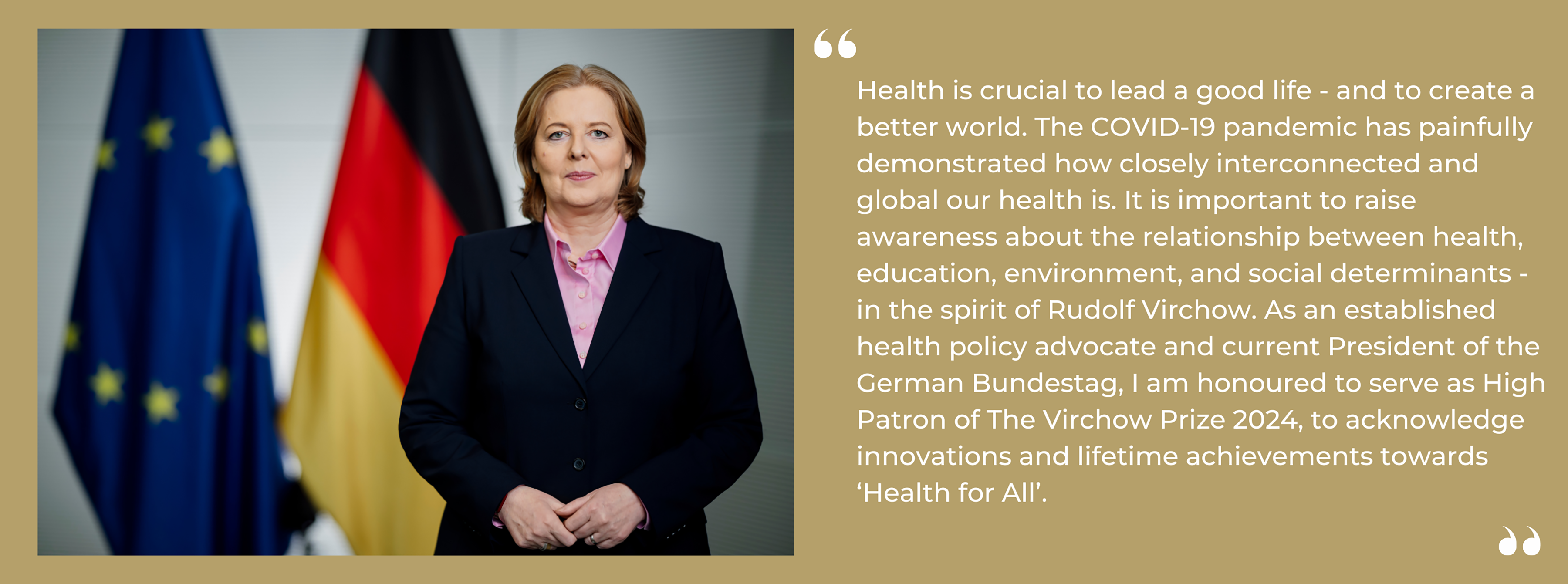
© Photograph: German Bundestag / Tobias Koch
The Virchow Prize 2024, same as in 2023, has been held under the High Patronage of the President of the German Bundestag (German Parliament), Bärbel Bas. Under the High Patron, the mission of the international Virchow Prize and its alignment with health-related Sustainable Development Goals within the United Nations 2030 Agenda are endorsed.
One of the Virchow Foundation’s goals is to enhance and strengthen a core value of German policy: multilateral, humanitarian-focused international cooperation. Therefore, bipartisan support from the Bundestag, the patronage of Federal President Frank-Walter Steinmeier in 2022, and from 2023, Parliament President Bärbel Bas, are crucial.
The symbolizing of this corporate identity of Berlin and Germany, striving towards global commitment and collaboration, is emphasized by the sponsorship of Bundestag President Bärbel Bas and the hosting by the Governing Mayor of Berlin at the Red Town Hall as well as by the deliberation on the Virchow Prize on October 14, 2022, which for the first time put global health on a plenary debate agenda at the German Bundestag.
The year 2024 marks another milestone for the Virchow Foundation, awarding the third laureate of the Virchow Prize; continuing to create momentum and raise awareness of global health to achieve “Health for All”.
The Virchow Foundation for Global Health is truly honoured to again award the Virchow Prize under the distinguished recognition of President Bas.
Virchow Prize Dinner
On October 16, 2023, an exclusive Virchow Prize Dinner to honour The Virchow Prize Laureate 2023, Rose Leke, with special presence by High Patron and President of the German Bundestag, Bärbel Bas, was held in the Berlin Global Health Collective. It was an evening marked with engaging conversations and networking which enhances our common understanding of various perspectives and establishes a foundation for potential collaborations and partnerships, driving positive change.
See some memorable moments below.
THE VIRCHOW PRIZE 2024 HIGHLIGHTS
Saturday, October 12, 2024 | 17:00 CET
© Henning Schacht
President | German Bundestag
Ms Bärbel Bas
Director-General | World Health Organization
Dr Tedros Adhanom Ghebreyesus
The Virchow Prize Award Ceremony | Livestream
Saturday, October 12, 2024 | 17:00 CET
Experience the 2024 Award Ceremony Musicians
Program Booklet
THE VIRCHOW PRIZE LECTURE – HOSTED BY ESMT
Friday, October 11, 2024 | 11:30 CET
To kick off an exciting few days for the Virchow Prize 2024 Laureates, Lucy Gilson and Johan Rockström, the Virchow Prize Lecture was organised in their honour. Kindly hosted with our esteemed partner the ESMT Berlin, their lectures explored the critical and timely topic of holistic and systems-based approaches to safeguarding “Health for All” and the crucial interconnectedness of health with the different levels of health systems, the UN Sustainable Development Goals (SDGs) and the planetary boundaries of environmental sustainability, highlighting the importance of integrated strategies to address complex global challenges towards our common goal of achieving SDG3 “Good Health and Well-Being”.
Their lectures were then followed by a dynamic panel discussion moderated by Prof. Dr Ole Petter Ottersen, Vice President of the Virchow Foundation and Former President of the Karolinska Institutet. The panel explores the intersection of health and environment, offering insights into best practices, policy frameworks, and innovative solutions for global challenges.
Other distinguished speakers included
- Prof. Jörg Rocholl, PhD | President of the ESMT Berlin and Council Member of the Virchow Foundation
- Iris Plöger | Member of the Executive Board of the Federation of German Industries (BDI e.V.)
- Roland Göhde | Co-Founder and CEO of the Virchow Foundation



